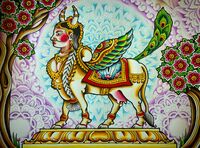Kuladara: Difference between revisions
Jump to navigation
Jump to search
Lyooonheimer (talk | contribs) No edit summary |
Lyooonheimer (talk | contribs) No edit summary |
||
| Line 80: | Line 80: | ||
{{Template:Gaism}} | {{Template:Gaism}} | ||
'''Kuladara''' ([[Mahanan]]: कुलदार, Kuladāra) also known as Sabaikā Bhagavāna (God of All) is the sole God/Goddess of [[Gaism]], who is considered to be the creator of the world and of all of the human race. Kuladara has no official interpretation, being seen as either a woman or a man, a cow or a human or a mixture of both depending on the interpretation of Kuladara. | '''Kuladara''' ([[Mahanan]]: कुलदार, Kuladāra) also known as Sabaikā Bhagavāna (God of All) is the sole God/Goddess of [[Gaism]], who is considered to be the creator of the world and of all of the human race. Kuladara has no official interpretation, being seen as either a woman or a man, a cow or a human or a mixture of both depending on the interpretation of Kuladara. Kuladara is also 'accepted' in the {{wp|Hindu}} religion as one of the Eleven {{wp|Mahavidya}}, instead of the singular god. | ||
==Etymology== | |||
==Kuladara in Gaism== | |||
==Kuladara in Hinduism== | |||
==Modern Interpretations== | |||
==Past Interpretations== | |||
==Importance== | |||
==Referances== | |||
{{reflist}} | |||
[[Category:Gaism]] | [[Category:Gaism]] | ||
Revision as of 11:07, 14 April 2022
God of all, Kuladara | |
|---|---|
कुलदार | |
 |
| Part of a series on |
| Gaism |
|---|
 |
Kuladara (Mahanan: कुलदार, Kuladāra) also known as Sabaikā Bhagavāna (God of All) is the sole God/Goddess of Gaism, who is considered to be the creator of the world and of all of the human race. Kuladara has no official interpretation, being seen as either a woman or a man, a cow or a human or a mixture of both depending on the interpretation of Kuladara. Kuladara is also 'accepted' in the Hindu religion as one of the Eleven Mahavidya, instead of the singular god.